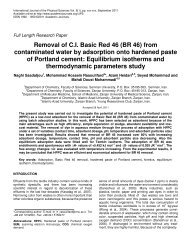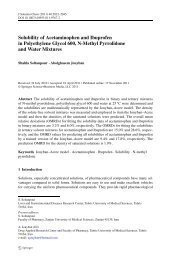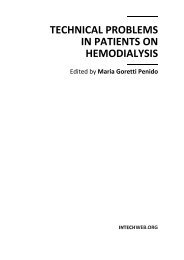new insights into the prevention and treatment of bulimia nervosa
new insights into the prevention and treatment of bulimia nervosa
new insights into the prevention and treatment of bulimia nervosa
Create successful ePaper yourself
Turn your PDF publications into a flip-book with our unique Google optimized e-Paper software.
Interpersonal Problems in People with Bulimia Nervosa <strong>and</strong> <strong>the</strong> Role <strong>of</strong> Interpersonal Psycho<strong>the</strong>rapy<br />
interpersonal context <strong>and</strong> maintenance <strong>of</strong> <strong>the</strong> eating disorder. Perhaps this sets <strong>the</strong> ground<br />
for facilitating change <strong>and</strong> <strong>the</strong> setting <strong>of</strong> interpersonal goals can instill hope. Although <strong>the</strong><br />
use <strong>of</strong> a case series was considered appropriate given <strong>the</strong> exploratory nature <strong>of</strong> <strong>the</strong> study, it<br />
is important to remember that <strong>the</strong>se preliminary findings should be interpreted within <strong>the</strong><br />
limitations <strong>of</strong> a case series design. Although <strong>the</strong>re is incidental evidence from clinicians <strong>and</strong><br />
patients <strong>of</strong> <strong>the</strong> effectiveness <strong>of</strong> this modified version <strong>of</strong> IPT for BN, <strong>the</strong>re is a lack <strong>of</strong> research<br />
evidence which can only been achieved by a control Trial.<br />
6. New modifications <strong>of</strong> IPT for patients with eating disorders<br />
In recent months, a <strong>new</strong> <strong>the</strong>oretical model <strong>of</strong> IPT for eating disorders has been proposed<br />
(Reiger et al., 2010). This model suggests that eating disorders are triggered by negative<br />
feedback regarding an individual’s social worth due to its negative effect on self-esteem <strong>and</strong><br />
associated mood. Eating disordered behaviours <strong>of</strong>ten begin because <strong>of</strong> this negative social<br />
evaluation, <strong>and</strong> over time such behaviours may become a more reliable source <strong>of</strong> self esteem<br />
<strong>and</strong> mood regulation than social interactions. The aim <strong>of</strong> IPT <strong>the</strong>n is to help <strong>the</strong> patient to<br />
develop positive, healthy relationships, which replace <strong>the</strong> eating disorder in <strong>the</strong> attainment<br />
<strong>of</strong> positive esteem <strong>and</strong> affect. This <strong>new</strong>ly proposed model also includes <strong>the</strong> monitoring <strong>of</strong><br />
eating disorder symptoms <strong>and</strong> o<strong>the</strong>r elements, which were taken out <strong>of</strong> <strong>the</strong> original IPT-BN<br />
to make it comparable with CBT. However, this <strong>new</strong> <strong>the</strong>rapeutic model has not yet been<br />
supported by empirical studies <strong>and</strong> does not differentiate between <strong>the</strong> <strong>treatment</strong> <strong>of</strong> anorexic<br />
<strong>and</strong> bulimic disorders.<br />
7. Conclusion<br />
Interpersonal difficulties are both vulnerability factors <strong>and</strong> consequences <strong>of</strong> several<br />
psychiatric disorders, including Bulimia Nervosa. Over <strong>the</strong> last several years a growing<br />
number <strong>of</strong> research studies have demonstrated <strong>the</strong> efficacy <strong>of</strong> IPT as a <strong>treatment</strong> for several<br />
conditions. Within <strong>the</strong> field <strong>of</strong> eating disorders, IPT has been shown to be effective for<br />
patients with BN, although it appears to work slower than CBT. In order to make this<br />
<strong>treatment</strong> more effective several authors in different countries have modified this <strong>treatment</strong><br />
fur<strong>the</strong>r. In spite <strong>of</strong> <strong>the</strong> modification that IPT has gone through, <strong>the</strong> core elements <strong>of</strong> <strong>the</strong><br />
<strong>the</strong>rapy have been retained. Throughout IPT, <strong>the</strong>rapists aim to help patients to identify <strong>the</strong><br />
interpersonal difficulties maintaining <strong>the</strong> eating disorders symptoms in order to work<br />
through <strong>the</strong>m. Although IPT has been used successfully over a number <strong>of</strong> years, research<br />
evidence for <strong>the</strong> <strong>new</strong> modified versions is still required.<br />
8. Acknowledgement<br />
We would like to acknowledge <strong>the</strong> IPT team in Leicester: Mrs Lesley McGrain, Ms Lesley<br />
Meadows, Dr Jonathan Baggott <strong>and</strong> Mr Chris Langham.<br />
9. References<br />
Agras, W.S., Walsh, T., Fairburn, C.G., Wilson, G.T., <strong>and</strong> Kraemer, H.C (2000) A multicenter<br />
comparison <strong>of</strong> cognitive-behavioral <strong>the</strong>rapy <strong>and</strong> interpersonal psycho<strong>the</strong>rapy for<br />
<strong>bulimia</strong> <strong>nervosa</strong>. Archives <strong>of</strong> General Psychiatry, 57, 5, 459-66<br />
9














![focuspdca.ppt [Compatibility Mode]](https://img.yumpu.com/22859457/1/190x146/focuspdcappt-compatibility-mode.jpg?quality=85)


